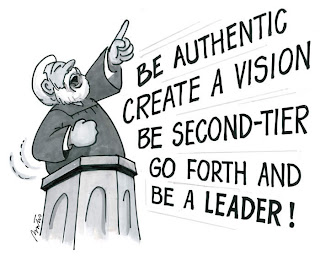Innovation has been coming up more in the strategy work I'm doing lately....as in, "this organization needs to be more innovative."
Unfortunately, the term innovation doesn't mean much to me.
Clearly it's important. I wouldn't be listening to my Ipod right now if Apple weren't a modern master at innovation.
Fortune's March 17 issue has a couple of articles on Apple. Apple's approach to innovation seems arrogant but effective - don't ask the consumer, just figure out what bugs us (Apple), eg, the cell phone, and build something better.
Compare that approach to Procter & Gamble, also covered in the same issue where 1) "we put the consumer at the center of everything we do", and 2) "we started thinking about innovation in new ways - we started from the premise that it's possible to run an innovation program in much the same way we run a factory".
So, the path is clear. There is no path.
Here are some thoughts for those as confused as I am about the innovation conversation:
> those with a strong desire to be more innovative probably need to clearly define why. What is the goal? The output? Is it a new product? A new process? A new way of managing that leads to more all round creativity?
> innovation is a strategy; is it a better strategy than some other way of achieving the same goal? For example, is innovation a better strategy than training everyone in the organization how to do their jobs better?
> if innovation is the right strategy, what is the plan? Who is in charge? What are the goals? Time frames? Process? Budgets?
For me, this is where the innovation conversation breaks down. In reality. I don't work for Apple or P&G. But the organizations I know, don't have an innovation plan. They haven't allocated budgets. No one is accountable for leading innovation.
Innovation will never happen in these organizations.
Right?
Wrong. I think.
Every organization I'm engaged with is developing either a new product or new approaches to doing whatever it is they do. They're growing and getting better at what they do.
Yes, some have significant challenges that require new and creative solutions. Maybe that requires a focus on innovation. Maybe.
What I am sure about is that all of them are making significant progress addressing what I would consider the basics of success in their business: better definition of corporate priorities and more focus on them; better, more capable managers who can mentor and lead teams; clearer measures and more effective processes for ensuring accountability.
As a result of progressing on these basics are these organization more innovative? Yeah, I think so.
Do they need to put more focus on innovation? No. At least that's not what I'm telling them.
More to come.
By Jim Crocker, past CEO and now Chair of Boardroom Metrics. Jim works with private and not-for-profit clients on corporate strategy and governance. His partner Karen McElroy leads an international business writing team that helps clients write and win RFP's.
Subscribe to:
Post Comments (Atom)
Leadership Smeadership
Okay. I know it’s a settings thing. Sometime, a long, long time ago – probably when leadership was being invented – I must have indicat...

-
In 2012 I've attended two HR conferences. They couldn't have been more different. The 2nd Annual Talent Management Development C...
-
Last night I got to have dinner with a group of 20 CIO’s. My role was to help bring the CEO perspective to them on what they do and h...
-
Okay. I know it’s a settings thing. Sometime, a long, long time ago – probably when leadership was being invented – I must have indicat...



No comments:
Post a Comment